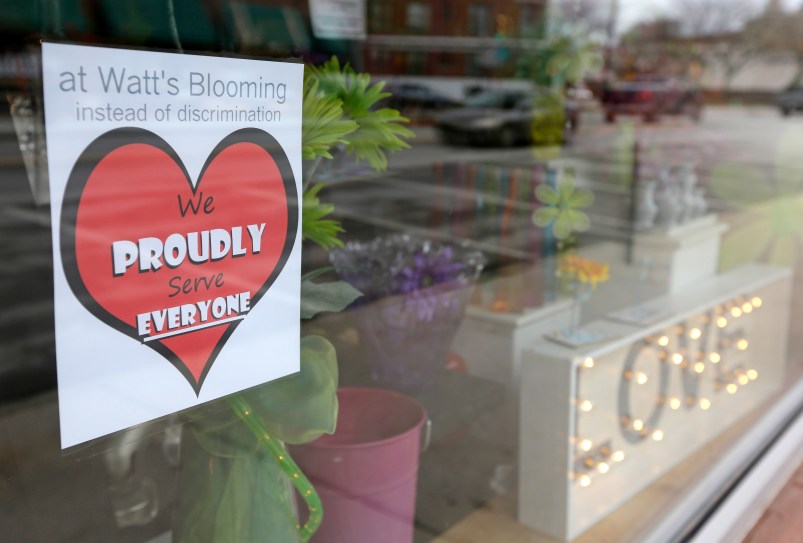Amid all the backlash and backpedaling that has followed the signing of Indiana’s new Religious Freedom Restoration Act, there’s one important perspective that has gotten lost: Christians who believe that sex outside of heterosexual marriage is wrong, and who oppose discrimination against gay people—both on religious grounds.
I know these people exist because they raised me.
My dad is a small-business owner who believes that gay relationships are wrong. The reason is religious: He believes the Bible teaches that sexual relationships should be reserved for married heterosexual couples. But he doesn’t believe this view should be imposed by law on those outside the faith.
As a building contractor, he has a lot of discretion over which jobs to take. However, when I was a teenager and a lesbian couple asked him to build a house, he said yes. He sees each job as an opportunity to demonstrate that Christians can be good, trustworthy people who do good, honest work. But more than that, he believes in treating people as human beings, not as sins. Building homes for people is his calling—one of the ways he serves God.
He got some criticism from a few folks in our church who believed that by building a house for a lesbian couple, he was supporting “the homosexual agenda.” But he never second-guessed his decision. He sees providing services to the public as a completely separate issue from religious freedom.
“As long as I’m free to express my beliefs, that doesn’t allow me in the public sphere to deprive people of their social rights,” he told me. “That’s something different. I’m serving the public, and I can’t discriminate like that. I think the conservative evangelical church has made a mistake in how they approach this whole issue.”
But my dad’s reasons for choosing to do business with gay people aren’t just about his belief in the separation of church and state. They are also deeply rooted in his faith. “As a Christian, I don’t think I have the freedom to write someone off or put them in a category, dehumanize them or love them less,” he says.
My dad is concerned that flawed definitions of religious freedom could be used to justify egregious failures of compassion, like Christian health care providers refusing to treat gay people. For him, nothing could be further from the spirit of Christianity.
Unlike my dad, I see no conflict between Christianity and homosexual relationships. I’m proud to be a member of a church with a married gay minister. But like my dad, I believe my Christian faith requires me to oppose prejudice and discrimination against gay people.
Religious freedom is an important issue, and the rights of religious minorities deserve protection. If a countercultural practice is at the core of a faith tradition and doesn’t cause harm to others, like Sikhs or Muslims wearing head coverings or Catholics serving communion wine to children, this religious practice deserves legal protection. But denying service to gay people is not a core Christian practice. And one of the biggest problems with so much of the debate around Indiana’s new bill, from both its supporters and its detractors, is that it conflates Christianity with denying people cake.
Christians of Indiana: No one is forcing you to change your beliefs about gay marriage. You do not need to have a gay marriage or perform one. But serving gay people and being in community with them does not actually compromise your religious beliefs at all. In fact, it is a perfect way to put your beliefs into practice.
Briallen Hopper is a Lecturer in English at Yale and a Public Voices Fellow with the Op-Ed Project.







As a non-believer I don’t have any religious values to wrestle with in my mind. People are people, and categorizing consenting adults for what they do with their junk seems downright childish and silly to me.
As someone in the service industry since the 1970’s, it would be inappropriate for me to think I was celebrating or participating in any wedding or event I worked. Yes, that is the proper word “worked.” It is the word used, “Are you working the wedding Saturday?” The choice of words of these folks is strange, like me they are the hired help.
If I had a business, I would not cater to elected officials (it is my believe they are all corrupt —the whole lot of them), people who lend and borrow (doing so is against Bible’s teachings), people who eat non-kosher food, prostitutes in all forms, etc. In other words, I’d only serve holy people, and celebrate their holiness.
I never quite got how catering a wedding or providing flowers implies moral, philosophical or personal agreement with the couple. What’s next, florists demanding to interview the couple to ensure they are a compatible match? “We’d be happy to provide the flowers if you married an Aries, but you will not be happy with a Sagittarius, so no roses for you.”
You should open a donut shop - win win!